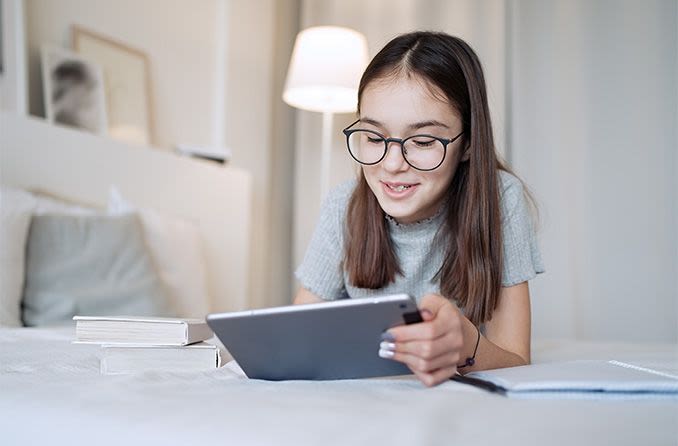The benefits of kids' blue light glasses

Blue light is all around us — it’s what makes the sky blue and what glows from the phone as your child plays games or watches a movie. So should you buy your kids blue light glasses?
Parents who worry about blue light from screens can limit their children’s screen time, teach them the 20/20/20 rule — looking 20 feet away for 20 seconds after 20 minutes in front of the screen — and buy their child blue light glasses.
So, what is blue light anyway? It’s visible light with shorter wavelengths and more energy than light at the other end of the colour spectrum. The sun is the primary source of blue light, but blue light also comes from:
Computers, tablets and smartphones
Fluorescent lights
LED lights
Television screens
The good news is there’s no evidence blue light from screens damages a child’s eyes but it’s hard to know if there are any long-term effects because screens haven’t been a daily part of our lives for that long.
CONCERNED ABOUT YOUR CHILD’S VISION? Book an appointment with an optician near you.
How do kids blue light glasses affect their eyes?
Some time in the sun each day is healthy for kids. In fact, a little daily sun exposure may reduce the risk for myopia or slow its progression.
But too much exposure to blue light from the sun over time could lead to retina damage. That’s because more blue light reaches a child’s retina than an adult’s.
And excess exposure to sunlight over a lifetime may lead to vision problems in adulthood. For example, blue light and UV light exposure may be linked to age-related macular degeneration, which can cause vision loss.
Blue light and screen time for kids
Kids get much less blue light exposure indoors than they do outdoors. But children who spend a lot of time in front of screens may be more likely to develop digital eye strain, also known as computer vision syndrome.
Signs of digital eye strain in kids may include:
Other risks of too much screen time for kids and too much blue light exposure include disruption of the body’s sleep/wake cycle. This can lead to crankiness, sleepiness at school and health issues.
A large study conducted by the University of Glasgow, involving more than 5,000 children who were followed up over two years, found a link between time sitting in front of a screen and an increase in blood pressure rates. It found that a worryingly high number of children – more than one in 10 – developed high blood pressure, a major risk factor for cardiovascular diseases in later life.
SEE RELATED: Children and technology: Protecting your child’s eyes
Do kids' blue light glasses really work?
One way to protect your child’s eyes from blue light at home and at school is to buy blue light glasses. You can buy prescription or non-prescription glasses that have special lenses designed to filter out blue light.
Blue light glasses block a specific segment of light wavelengths and can help to protect kids from digital eye strain. While blue light glasses don’t filter out all blue light, they can reduce your child’s exposure to blue-violet rays by 80 percent or more.
Parents may want to consider limiting screen time for younger kids and getting blue light glasses for kids who are 12 and up or younger kids who are looking at screens for hours a day, Lott says.
“Those are the kids I do recommend a blue light blocker for because they’re on their devices so incredibly much,” Lott says.
A good pair of children’s sunglasses also is essential for blocking UV light and blue light when your child is playing outside for hours or is doing an activity with lots of glare, like hanging out on the beach or skiing, polarized kids’ sunglasses that block 100% of UVA and UVB rays are particularly useful.
“If you’re wearing your sunglasses, your kids need to be wearing theirs,” is a good mantra.
LOOKING FOR BLUE LIGHT GLASSES FOR YOUR KID? Shop for blue light glasses for your child or teen at an optical practice near you or an online eyewear retailer.
Page published on Wednesday, 16 March 2022






